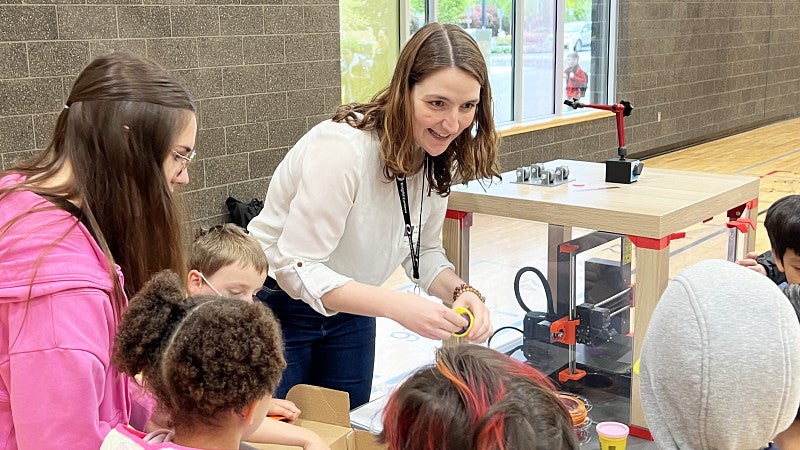March 2023
At the Knight Campus, “impact” is more than just a buzzword. It is literally written into our name and our vision statement.
As we continue to expand, so too does our impact. Our growing trainee application pools reflect our rising profile and are evidence of the success of our hands-on education and training programs. Recruitment is in full swing, offers of admission are out to potential bioengineering Ph.D. candidates and acceptance letters will soon be circulating for accelerated master’s students in the Knight Campus Graduate Internship Program (KCGIP).
The KCGIP is also playing a central role in a recently announced $4.3 million grant from the National Science Foundation for Oregon Pathways to Industrial Research Careers, a program that is providing both financial and mentorship support to help low-income community college students pursue industrial research careers. Our own Stacey York, senior director of professional development and workforce readiness, is a co-principal investigator on the grant. The Knight Campus recently hosted an open house for prospective community college students interested in that program. We welcomed prospective bioengineering minors to two additional open houses in February and March. And our Knight Campus Undergraduate Scholars program just launched its fifth cohort, our biggest group yet with 20 students, more than half of them from underrepresented groups.
The impact of our faculty research continues to expand with projects like a timely innovation that seeks to improve health care equity being developed in Professor Keat Ghee Ong’s lab, which is funded by grants from the National Institutes of Health through a Small Business Technology Transfer program. The team is seeking to develop a better pulse oximeter — a critical medical device that measures blood oxygen saturation. The devices, which determine oxygen levels by shining visible and infrared lights through the finger, have a major flaw — they don’t work very well for patients with darker skin tones. As a result, people of color may receive inaccurate diagnoses, leading to suboptimal medical care. Researchers in the Ong Lab are addressing the challenge with a combination of innovative technology and computational approaches. They are developing a novel technology that uses a color imagery platform to create a digital representation of different skin tones, compensating for inaccuracies and ensuring an accurate reading no matter who you are.
Meanwhile, the Dalton Lab is effecting change by leveraging grassroots enthusiasm for accessible 3D printers and has unveiled open-source versions of its revolutionary melt electrowriting technology. By enabling researchers to help themselves, a do-it-yourself kit for microscale 3D printing is now available for less than $2,000 - smashing the price point for commercial systems that can cost upwards of $100,000. These microscale 3D printers are built on a no-compromise open-source 3D printer that is highly adaptable and fosters innovations in manufacturing research. By making advanced manufacturing technologies accessible to all researchers, the Knight Campus is becoming a leader in biofabrication while enhancing research innovation conducted at the bench here in Eugene.
Health care equity is of great importance to our Knight Campus researchers, including the lab of Assistant Professor Gabriella Lindberg. She is seeking to develop patient-centric platforms that allow more patients to access treatments that have been customized to their specific health needs. She and her team are also focused on developing treatments that work across different patient populations.
The impact of our science outreach efforts has never been stronger. Earlier this month, our own Winter 2023 Entrepreneurship Speaker Series, drew a crowd from on and off campus who came to hear a captivating talk by Janis Weeks on her journey from academic neuroscience to co-founding the biotech company InVivo Biosystems. Over the past few months, we’ve hosted events put on by numerous partner organizations including Onward Eugene/the Oregon Bioscience Association, the Ballmer Institute for Children’s Behavioral Health and the Young Presidents’ Organization. And we’ve co-sponsored a pair of events with the Center for Science Communication Research (SCR), including the third annual Research Forum and the upcoming Johnston Lecture with Dr. Rene Salas, an expert on climate change and its implications for health and health care delivery.
It’s always great to host events on campus, but I’m looking forward to the opportunity to bring our research out into the community with our signature community science event Science Knight Out returning to the Shedd Institute at 6:30 p.m. on Tuesday, April 11. I’m equally excited by the opportunity to introduce our speaker, Knight Campus Department of Bioengineering Chair Danielle Benoit. Danielle’s talk, “Precision Medicine for Better Bones,” will highlight her research at the interface of medicine and engineering. A leader in the development of new drug delivery systems, she has provided insights into the translation of tissue engineering strategies for bone healing and the development of new tissue models to discover new drugs. She seeks to understand how biomaterials can control the behavior of cells to improve the treatment of diseases or injuries.
Speaking of expanding our impact, I want to take a moment to celebrate our literal expansion and the beginning of construction on our second Knight Campus building. When it’s completed, Building 2 will double our capacity for bioengineering research and the development of new biomedical technologies. It offers additional room for our expanding academic programs, spin spaces to incubate new startup companies, a state-of-the-art core facility and the second of two Papé Family Innovation Center spaces. It furthers our mission of science advancing society, enabling new programs, facilities, resources, and people — all dedicated to accelerating (and expanding) the impact cycle of scientific discovery.

